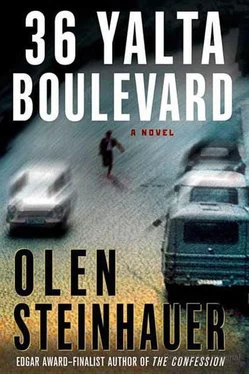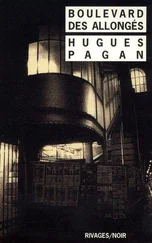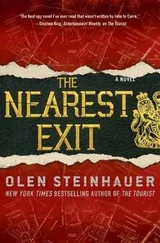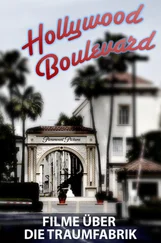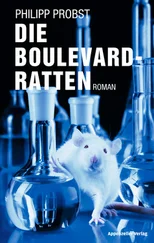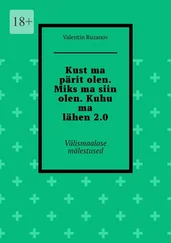Olen Steinhauer - 36 Yalta Boulevard
Здесь есть возможность читать онлайн «Olen Steinhauer - 36 Yalta Boulevard» весь текст электронной книги совершенно бесплатно (целиком полную версию без сокращений). В некоторых случаях можно слушать аудио, скачать через торрент в формате fb2 и присутствует краткое содержание. Жанр: Политический детектив, на английском языке. Описание произведения, (предисловие) а так же отзывы посетителей доступны на портале библиотеки ЛибКат.
- Название:36 Yalta Boulevard
- Автор:
- Жанр:
- Год:неизвестен
- ISBN:нет данных
- Рейтинг книги:3 / 5. Голосов: 1
-
Избранное:Добавить в избранное
- Отзывы:
-
Ваша оценка:
- 60
- 1
- 2
- 3
- 4
- 5
36 Yalta Boulevard: краткое содержание, описание и аннотация
Предлагаем к чтению аннотацию, описание, краткое содержание или предисловие (зависит от того, что написал сам автор книги «36 Yalta Boulevard»). Если вы не нашли необходимую информацию о книге — напишите в комментариях, мы постараемся отыскать её.
36 Yalta Boulevard — читать онлайн бесплатно полную книгу (весь текст) целиком
Ниже представлен текст книги, разбитый по страницам. Система сохранения места последней прочитанной страницы, позволяет с удобством читать онлайн бесплатно книгу «36 Yalta Boulevard», без необходимости каждый раз заново искать на чём Вы остановились. Поставьте закладку, и сможете в любой момент перейти на страницу, на которой закончили чтение.
Интервал:
Закладка:
He shook his head.
“Both of us work for the Ministry for State Security, on Yalta Boulevard.”
“The Ministry for…” Tourists jogged across the road in front of them. “I’m a spy?”
Josef Lochert laughed a loud, punchy laugh. “Listen to you! Major Brano Oleksy Sev asking me if he’s a spy!”
“What about Dijana Frankovic?”
He licked his lips. “She’s nobody, okay? A whore. And trouble. Forget about her. And stop with the questions. You’ll get all your answers soon enough.”
Lochert dropped him off at the Flughafen Wien departures door and handed his bag over from the backseat. Brano placed it on the curb. “You said it’s reserved?”
“Yeah,” said Lochert from inside the car. “Hand over your passport at the TisAir desk. It’s the two o’clock flight.”
“Okay.”
“Have a good trip, Brano,” he said. “Now close the door.”
Brano watched the Mercedes drive away.
The airport was cool, with a vast marble floor leading to a row of airline desks. He waited behind a businessman arguing with the young woman standing under the TISA AERO-TRANSPORT sign, until the man, frustrated, walked off. The woman smiled at Brano.
“May I help you?”
“I have a reservation.” He handed over his passport. “The two o’clock flight.”
The woman examined a list on the desk. “I’m afraid there’s no reservation for you, Herr Sev.”
“But my friend made the call.”
She read over the list again. “No, there’s not one here, but it doesn’t matter. There’s a free seat.”
He paid for the ticket, handed over his bag, and asked for the bathroom. “Just past the lounge,” she said, pointing.
He lit a cigarette as he passed tired-looking travelers sitting with their bags, some reading newspapers, others books. Beside the bathrooms was a line of pay phones, and he considered trying Dijana Frankovic’s number again. Much later, he would wonder if calling again would have changed anything that followed. But there’s never any way to know these things.
He washed sweat from his forehead and stared at himself again in the mirror. He was becoming used to this round, flat-cheekboned face and could even spot his ethnicity-Polish features. From the northern part of his country, perhaps. But that was all the mirror told him.
At the urinal, he felt dizzy again, the spot on the back of his head aching. A large man in a suit took the urinal next to him, then looked over.
“You all right?”
“I’m fine. Just a little dizziness.”
This Austrian, Brano noticed, didn’t unzip his fly. “You’re Brano Sev, right?”
“I-” He zipped himself up. “Do I know you?”
“No, Brano,” said the Austrian. He reached into his jacket pocket but didn’t take his hand back out. “Why don’t you come with me?”
The dizziness was intensifying. “Where?”
“We’ll have a little talk.”
“I have a plane to catch.”
As the Austrian stepped closer, his hand withdrew, holding a small pistol. “Forget about the plane, Brano.”
Brano’s head cleared. He leaned forward, as if to be sick.
“Hey, are you-” said the Austrian, crouching, but didn’t finish because Brano swung his head back up into the man’s nose, at the same time thrusting a fist into the man’s stomach. The Austrian stumbled back, a hand on his bloody nose, the other trying to keep hold of the pistol. Brano kneed him in the groin and twisted the gun hand until he had the pistol. He stepped back.
The Austrian stared at him, covering his nose and his groin.
“How many more?” said Brano.
“Jesus, Brano. I wasn’t trying to kill you.”
“How many more?”
The Austrian leaned against the sinks, then looked in the mirror. His eyes dripped and his nose bled. “Just one. He’s watching the front exit.”
“How long before he comes inside?”
“Ten, fifteen minutes. Look at this goddamned nose!”
“And you. You know who I am?”
“I wouldn’t be any good if I didn’t know who you were. The new Kristina Urban, the Vienna rezident.”
“Who do you work for?”
The Austrian was becoming impatient. “Who do you think I work for?”
“Just answer the question.”
“The Abwehramt, obviously. What’s with all these questions?”
Everything Brano had done in this bathroom had been automatic, as if he were being controlled from somewhere else. Now he tried to think. The Abwehramt was Austrian foreign intelligence. He was the Vienna rezident, who controlled his country’s intelligence operations in Vienna. And he had killed a man named Bertrand Richter.
“Why do you want me?”
“Because we were told to get you.”
“Why were you told to get me?”
The Austrian finally let go of his groin and uncovered his nose. It was beginning to swell. “You’ve been in this business long enough to know that we just do what we’re told, and we seldom know why.”
“Come here,” Brano said as he walked to one of the stalls. He opened the door. “Come on. Inside.”
He stepped back as the Austrian entered the stall and turned around.
“Face the wall.”
“Christ, Brano. There’s no need to shoot me.”
Brano swung the pistol into the back of the Austrian’s neck and watched him crumple onto the toilet.
At the gate, he wondered when the man in the stall would wake up, rush out to his colleague or call airport security, and come to take him away. But over the next twenty minutes no one came, and as he paced he thought about the name the Austrian had told him-Kristina Urban. The name, for some reason, made him think of flight. He tried to work through the details-a dead man, a woman’s phone number, a hotel, a man named Josef Lochert. Brano was a spy, the Vienna rezident, and the Abwehramt were after him.
He thanked the stewardess who stamped his ticket, then boarded the crowded plane.
His seat was next to a young Austrian-twenty, maybe-who lit a cigarette as soon as he sat down and refused to buckle his belt. “They make me feel trapped,” he said in a whisper.
Brano nodded, but at that moment he remembered why the name Kristina Urban evoked flight. Last month, the Abwehramt had tossed her from a high window of the Hotel Inter-Continental.
“Feeling trapped makes me anxious,” the young Austrian told him.
“Me, too.”
“You should try hashish. Settle you down.”
Brano was no longer listening. The dizziness came back, and he leaned forward, settling his head against the next seat.
“You all right?” said his companion.
The stabilizing pressure of takeoff eased his sickness, and when the wheels left the ground he remembered more.
It had begun at home, in the Capital, in the office of a very old friend, Laszlo Cerny, a man with a thick, unkempt mustache, a colonel in the Ministry for State Security. GAVRILO was the subject of a file open in front of him, and now, on the plane, he remembered its contents. On 6 May, in Vienna’s Stadtpark, a routine money exchange had been stopped by Viennese intelligence before the exchangers could even meet. Then, on 18 June, an apartment used to radio messages across the Iron Curtain had been raided. Three people had been caught-among them Kristina Urban, the Vienna rezident. Two weeks later, she was thrown out the hotel window.
Brano closed his eyes as they gained altitude.
He arrived in Vienna just last month to replace Kristina Urban and to uncover the leak that the Ministry had code-named GAVRILO. Before setting up in the cultural attache office of the embassy on Ebendorferstraae, he had specialists go over the building again. Seven electronic bugs were found, so Brano, to the dismay of the head of embassy security, Major Nikolai Romek, decided to work out of the Hotel Kaiserin Elisabeth rather than risk more security leaks. From there, he visited three suspect operatives and fed each one false information. Theodore Kraus believed that two men would meet and exchange codebooks inside the Ruprechtskirche on 14 July, Ingrid Petritsch believed that Erich Glasser, an employee of Austrian intelligence, would deliver classified files to a Czech agent in the Hotel Terminus on 28 July. And Bertrand Richter was told that a shipment of automatic rifles would be smuggled from Austria into Hungary near Szom-bathely on the evening of 8 August in a West German truck.
Читать дальшеИнтервал:
Закладка:
Похожие книги на «36 Yalta Boulevard»
Представляем Вашему вниманию похожие книги на «36 Yalta Boulevard» списком для выбора. Мы отобрали схожую по названию и смыслу литературу в надежде предоставить читателям больше вариантов отыскать новые, интересные, ещё непрочитанные произведения.
Обсуждение, отзывы о книге «36 Yalta Boulevard» и просто собственные мнения читателей. Оставьте ваши комментарии, напишите, что Вы думаете о произведении, его смысле или главных героях. Укажите что конкретно понравилось, а что нет, и почему Вы так считаете.
